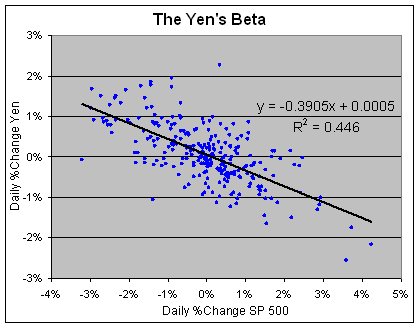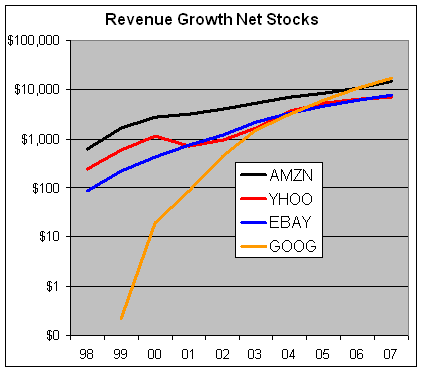Archive for May, 2008
-
The Yen’s Negative Beta
Eddy Elfenbein, May 29th, 2008 at 4:09 pmGreg Mankiw sees this chart and wonders, “Is the yen a negative beta asset?” Well, let’s take a look.
The graph below shows the daily changes for the past year of the S&P 500 (^GSPC) on the X-axis. On the Y-axis are the daily changes of the Yen ETF (FXY). The slope of the least-squares line is the estimated Beta coefficient, which in this case is -0.3905.

So, yes Professor. It is. -
But Of Course
Eddy Elfenbein, May 29th, 2008 at 8:46 amFrom The Economist‘s corrections box:
Our Contents box last week in some editions referred to Albert Hofmann, the father of LSD, as German. He was, of course, Swiss. Our apologies.
The “of course” is just perfect. More British would have been “apparently.”
(Shamelessly stolen from Elizabeth Spiers.) -
The Buy List Is Holding Up Well
Eddy Elfenbein, May 28th, 2008 at 4:51 pmEven though the market has been a bit shaky, our Buy List is doing fine. In the last six sessions, the S&P 500 is down -2.51%, but our Buy List is up 0.12%.
-
Revenues at the Internet Stocks
Eddy Elfenbein, May 28th, 2008 at 3:42 pmGrowing sales isn’t everything, but it sure helps. Here’s a look at the growth in revenues over the last ten years at Amazon (AMZN), Yahoo (YHOO), eBay (EBAY) and Google (GOOG):

The number is in millions. -
Donaldson Raises Its Estimate for the Third Time
Eddy Elfenbein, May 28th, 2008 at 12:08 pmMore good news from another boring stock. After the bell yesterday, Donaldson (DCI) reported earnings for its fiscal third quarter of 57 cents a share. That’s six cents higher than Wall Street’s estimate, and it’s also a nice gain over last year’s third quarter when DCI netted 49 cents a share.
I was also very happy to see that for the third time, Donaldson raised its FY 2008 earnings-per-share forecast. Back in September, the company expected EPS of $1.92 to $2.01. Then in November, they raised it to $1.97 to $2.07. In February, they went to $2 to $2.10 a share, and now in May, they’ve raised it to $2.08 to $2.13. Their fiscal year ends at the end of July.
The company is well on its way to a 19th straight record year for earnings. For the first three quarters of this fiscal year, Donaldson has earned $1.52 a share, which is a 17% increase over the $1.30 they made last year. The only need to make another 32 cents a share in the fourth quarter to beat last year’s total, and the company expects EPS of 56 cents to 61 cents. Also, in January, the company increased its dividend for the 22nd straight year.Year………….Sales……………..EPS
1990…………$422.9……………$0.19
1991…………$457.7……………$0.21
1992…………$482.1……………$0.23
1993…………$533.3……………$0.26
1994…………$593.5……………$0.30
1995…………$704.0……………$0.37
1996…………$758.6……………$0.42
1997…………$833.3……………$0.50
1998…………$940.4……………$0.57
1999…………$944.1……………$0.66
2000…………$1,092.3…………$0.76
2001…………$1,137.0…………$0.83
2002…………$1,126.0…………$0.95
2003…………$1,218.3…………$1.05
2004…………$1,415.0…………$1.18
2005…………$1,595.7…………$1.27
2006…………$1,694.3…………$1.55
2007…………$1,918.8…………$1.83
2008…………$2,170.0…………$2.08 to $2.13 (est) -
Jos. A. Bank: Clearance Sale
Eddy Elfenbein, May 27th, 2008 at 11:02 amKiplinger looks at one of our most frustrating stocks, Jos. A. Bank (JOSB):
Investors are uneasy with Bank because the Hampstead, Md., retailer shuns Wall Street. In January, the company (symbol JOSB) stopped reporting monthly same-store sales, which track sales at stores that have been open for a year or more. Same-store sales give investors a clearer sense of how the retailer is performing because the measure excludes revenue from newly opened locations. Bank also skips the customary question-and-answer sessions with analysts on its quarterly conference calls and doesn’t make earnings projections.
But look past Bank’s unfortunate cone of silence and you’ll see a high-end retailer in better financial shape than its battered stock would indicate. The company has grown rapidly under chief executive Robert Wildrick, who took control of the 103-year-old retailer in 1999.
Sales have tripled from $194 million in fiscal 1999 to $604 million in fiscal 2007, which ended last January 31. Net profit has gone up every year, from $3 million in 1999 to $50 million in 2007. In 1999, Bank had less than 100 stores in the U.S. Now it has more than 420 locations. -
Wall Strip on Hasbro
Eddy Elfenbein, May 27th, 2008 at 7:35 amJulie looks at Hasbro (HAS). After nine long years, the stock finally made a new all-time high recently. In 1974, you could have picked up shares of Hasbro for about 2.4 cents each. That’s adjusting for many, many splits. Not including dividends, the stock is up about 140,000% since. In other words, there’s a lot of money to be made in toys…just ask any adult male.
(Note to Julie: There’s no capital of Istanbul. It’s the capital city of Constantinople.) -
In Memoriam
Eddy Elfenbein, May 26th, 2008 at 4:36 pm
It is, in a way, an odd thing to honor those who died in defense of our country, in defense of us, in wars far away. The imagination plays a trick. We see these soldiers in our mind as old and wise. We see them as something like the Founding Fathers, grave and gray haired. But most of them were boys when they died, and they gave up two lives — the one they were living and the one they would have lived. When they died, they gave up their chance to be husbands and fathers and grandfathers. They gave up their chance to be revered old men. They gave up everything for our country, for us. And all we can do is remember.
—Ronald Reagan -
Momentum Has Lost Some Momentum
Eddy Elfenbein, May 23rd, 2008 at 11:04 pmKirzner Fervor has a great post on building a trading strategy off the stocks market’s momentum. The bottom line is that historically, it’s worked very well, but the in recent years, the advantages have dissipated. Such is the story of much data-mining.
After my initial post on the market’s ability to carry a one-day rally or sell-off into the next day, I had an emailer point out that the effect has worn off in recent years. I had meant to follow up on it, but I got distracted. Such is the story of much blogging.
I’m still amazed at the historical effect of the stock market’s momentum. To quote myself:This means that the market’s entire gain (capital gains since 1950) has come on days following a 0.64% up move. The rest of the time (over 80%), the market is net flat. Half the market’s gain came on day’s following 3.2% up moves. On average, that happens slightly less than once a year.
-
Maxine Waters Threatens to Nationalize Oil Companies
Eddy Elfenbein, May 23rd, 2008 at 1:34 pmNo, really. From the NYT:
In one of the more pointed exchanges, Representative Maxine Waters, Democrat of California, seized on the record $40.6 billion profit of Exxon Mobil in 2007. She pounded on the company’s senior vice president, J. Stephen Simon, demanding to know if gas prices would be lower if the company earned a few billion dollars less.
At another point, Ms. Waters brazenly suggested that perhaps the American oil industry should be nationalized, acknowledging that it was an “extreme step” but one that might be necessary if outsize profits and exorbitant gasoline prices continued.I have one small correction. Last year, ExxonMobil didn’t earn $40 billion, it earned $70 billion. Guess where that missing $30 billion went? I’ll give you a hint: Rep. Waters’ salary.
Here’s the video:
- Tweets by @EddyElfenbein
-
-
Archives
- June 2024
- May 2024
- April 2024
- March 2024
- February 2024
- January 2024
- December 2023
- November 2023
- October 2023
- September 2023
- August 2023
- July 2023
- June 2023
- May 2023
- April 2023
- March 2023
- February 2023
- January 2023
- December 2022
- November 2022
- October 2022
- September 2022
- August 2022
- July 2022
- June 2022
- May 2022
- April 2022
- March 2022
- February 2022
- January 2022
- December 2021
- November 2021
- October 2021
- September 2021
- August 2021
- July 2021
- June 2021
- May 2021
- April 2021
- March 2021
- February 2021
- January 2021
- December 2020
- November 2020
- October 2020
- September 2020
- August 2020
- July 2020
- June 2020
- May 2020
- April 2020
- March 2020
- February 2020
- January 2020
- December 2019
- November 2019
- October 2019
- September 2019
- August 2019
- July 2019
- June 2019
- May 2019
- April 2019
- March 2019
- February 2019
- January 2019
- December 2018
- November 2018
- October 2018
- September 2018
- August 2018
- July 2018
- June 2018
- May 2018
- April 2018
- March 2018
- February 2018
- January 2018
- December 2017
- November 2017
- October 2017
- September 2017
- August 2017
- July 2017
- June 2017
- May 2017
- April 2017
- March 2017
- February 2017
- January 2017
- December 2016
- November 2016
- October 2016
- September 2016
- August 2016
- July 2016
- June 2016
- May 2016
- April 2016
- March 2016
- February 2016
- January 2016
- December 2015
- November 2015
- October 2015
- September 2015
- August 2015
- July 2015
- June 2015
- May 2015
- April 2015
- March 2015
- February 2015
- January 2015
- December 2014
- November 2014
- October 2014
- September 2014
- August 2014
- July 2014
- June 2014
- May 2014
- April 2014
- March 2014
- February 2014
- January 2014
- December 2013
- November 2013
- October 2013
- September 2013
- August 2013
- July 2013
- June 2013
- May 2013
- April 2013
- March 2013
- February 2013
- January 2013
- December 2012
- November 2012
- October 2012
- September 2012
- August 2012
- July 2012
- June 2012
- May 2012
- April 2012
- March 2012
- February 2012
- January 2012
- December 2011
- November 2011
- October 2011
- September 2011
- August 2011
- July 2011
- June 2011
- May 2011
- April 2011
- March 2011
- February 2011
- January 2011
- December 2010
- November 2010
- October 2010
- September 2010
- August 2010
- July 2010
- June 2010
- May 2010
- April 2010
- March 2010
- February 2010
- January 2010
- December 2009
- November 2009
- October 2009
- September 2009
- August 2009
- July 2009
- June 2009
- May 2009
- April 2009
- March 2009
- February 2009
- January 2009
- December 2008
- November 2008
- October 2008
- September 2008
- August 2008
- July 2008
- June 2008
- May 2008
- April 2008
- March 2008
- February 2008
- January 2008
- December 2007
- November 2007
- October 2007
- September 2007
- August 2007
- July 2007
- June 2007
- May 2007
- April 2007
- March 2007
- February 2007
- January 2007
- December 2006
- November 2006
- October 2006
- September 2006
- August 2006
- July 2006
- June 2006
- May 2006
- April 2006
- March 2006
- February 2006
- January 2006
- December 2005
- November 2005
- October 2005
- September 2005
- August 2005
- July 2005
 Eddy Elfenbein is a Washington, DC-based speaker, portfolio manager and editor of the blog Crossing Wall Street. His
Eddy Elfenbein is a Washington, DC-based speaker, portfolio manager and editor of the blog Crossing Wall Street. His